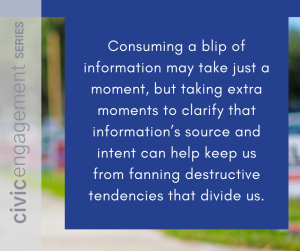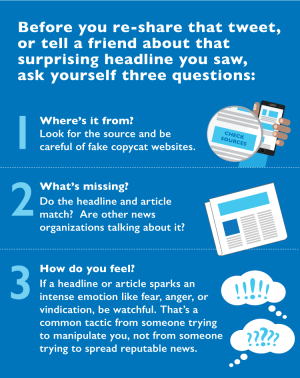In weeks approaching the election, we are awash in messaging. Not only are we seeing politician-approved ads, but likely also items in categories* including propaganda, lies, conspiracies, rumors, hoaxes, hyperpartisan content, falsehoods and manipulated media. Such misinformation undermines healthy democratic processes and discourages civic engagement. “The political health of our nation still suffers from the stain of antidemocratic exclusion. Efforts to restrict access to voting should be condemned and resisted,” warns the ELCA social message “Government and Civic Engagement in the United States: Discipleship in a Democracy.” Much misinformation feeds this problem. Guidance to advance our public life in the social message reads, “There is a sharp distinction between public service and private gain, a distinction measured by the straightforward question ‘Whose good is being served?’”
What’s the problem?
 Material from The Episcopal Church* cautions: “Audiences that mostly consume mainstream media see far more false insider stories and conspiracy theories than they might realize. While mainstream media itself remains highly reliable, online algorithms that favor content with high engagement instead of content with high veracity make it easier to transmit misinformation to these audiences through widely-used platforms like Facebook, Twitter, and YouTube.”
Material from The Episcopal Church* cautions: “Audiences that mostly consume mainstream media see far more false insider stories and conspiracy theories than they might realize. While mainstream media itself remains highly reliable, online algorithms that favor content with high engagement instead of content with high veracity make it easier to transmit misinformation to these audiences through widely-used platforms like Facebook, Twitter, and YouTube.”
When Hunger Network in Ohio, part of our Lutheran state public policy office network, reflected on online engagement, they wrote: “Social media offers everyone a chance to help shape the news and the content that each other sees. This is both a blessing and a curse…” They continued, “False news hurts our ability for civil discourse and wrestling with difficult issues to find solutions.”
Consuming a blip of information may take just a moment, but taking extra moments to clarify that information’s source and intent can help keep us from fanning destructive tendencies that divide us. “It seems that we want to cut ourselves off from each other,” said Presiding Bishop Elizabeth A. Eaton in her video address “We are in this together” (9/25/20). “Not only do we disagree, but we say the other is wrong, or they say we are wrong, or we accuse each other somehow of mounting a platform – like we want to divorce each other. But this is not possible. In baptism, the Spirit has forged us together in a bond that is unbreakable by any human sin or even by our anxiety or our desire to get away from the other side.”
What can we do about it?
 Check out the wide ranging exploration of a spectrum of misinformation, malinformation and disinformation, created and spread by “jokers, scammers, interest-driven entities, conspiracy theorists, ‘insiders’, celebrities, or your friends and family,” available from The Episcopal Church.
Check out the wide ranging exploration of a spectrum of misinformation, malinformation and disinformation, created and spread by “jokers, scammers, interest-driven entities, conspiracy theorists, ‘insiders’, celebrities, or your friends and family,” available from The Episcopal Church.
“Misinformation, Disinformation, Fake News: Why Do We Care?“
We won’t catch all that is streaming past us, but we can help stop contribution to the problem.
Among remedying tips in the piece is: “Consuming high-quality, diverse media improves our understanding of the world and equips us to identify and critically evaluate misinformation. Even if you don’t follow every trusted source closely, knowing where to go to find accurate information or a different perspective about a topic is extremely helpful.” Then there are the three questions to run through before you “re-share that tweet, or tell a friend about that surprising headline you saw.” Where’s it from? What’s missing? How do you feel? [See graphic for additional description.]
The feeling when we share should be the affirmation of contribution to constructive discussion. “We are one body in Christ,” proclaimed Presiding Bishop Eaton. “This is the witness we in the ELCA need to give to the world and to understand and live ourselves.”
*”Misinformation, Disinformation, Fake News: Why Do We Care,” post from Office of Government Relations of The Episcopal Church (May 21, 2020 update), content shared by permission
